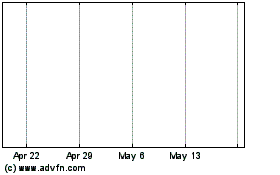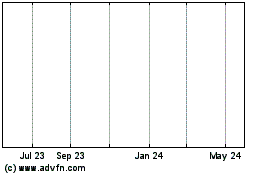U.S. V. ValueAct: Defining Activism
April 05 2016 - 3:03AM
Dow Jones News
(FROM THE WALL STREET JOURNAL 4/5/16)
By David Benoit
A U.S. government lawsuit against one of the biggest activist
hedge funds could provide more clarity in a long-running debate
over exactly what it means to be an activist investor.
The Justice Department on Monday accused ValueAct Capital
Management LP of failing to properly disclose about $2.5 billion in
purchases of shares in oil-field-services companies Baker Hughes
Inc. and Halliburton Co. in late 2014. The suit seeks $19 million
in damages from the hedge fund, which bought the shares after
Halliburton reached a deal to buy Baker Hughes for $35 billion.
At issue is whether investors who intend to buy minority stakes
in companies must seek antitrust clearance and, therefore, publicly
disclose their purchases. The Justice Department said ValueAct
sought to sway the management of both companies and exert influence
over the merger, which should have triggered requirements to
disclose the share purchases
ValueAct said the "most basic principles of shareholder rights"
allow it to have a relationship with company management, conduct
due diligence on investments and engage in "ordinary course
communications" with other shareholders.
"We have acted entirely properly and in compliance with the
law," Allison Bennington, the firm's general counsel, said in a
statement.
Activists and their detractors have long argued about whether
the investors, which typically seek to influence a company's
decision making, should be able to acquire large stakes out of the
public eye. This latest legal battle could provide more clarity
about what counts as attempting to influence a company's
management.
The Hart-Scott-Rodino Act, or HSR, requires acquirers of stock
worth more than $76.3 million to publicly alert regulators. The
rule is meant to allow the government to get ahead of any deals
that may potentially violate antitrust regulations.
Purchases of less than 10% of a company's shares that are made
"solely for the purpose of investment" are exempt from the filing
requirement. But investors can only rely on that exemption if they
are passive, or have "no intention of participating in the
formulation, determination or direction of the basic business
decisions."
What that means has been a question for activists and antitrust
lawyers for years. Daniel Loeb's Third Point LLC initially fought a
lawsuit from the Justice Department alleging that it violated the
rules when it bought shares of Yahoo Inc., but the hedge fund
settled last year without paying a fine.
In its lawsuit against ValueAct, filed with the U.S. District
Court in San Francisco, the Justice Department accused the firm of
planning to influence management of both Baker Hughes and
Halliburton and the structure of their merger, citing internal
emails and notes of meetings between ValueAct and executives at
both companies. The activist supports the deal, which hasn't
closed.
ValueAct thinks the investment was entirely passive when it was
first made, according to a person familiar with the fund. It
believed Halliburton and Baker Hughes would benefit from the
combination, the person said.
The fund divulged its Baker Hughes stake when it crossed the
ownership threshold of 5% -- the point at which Securities and
Exchange Commission regulations mandate disclosure -- but it didn't
disclose any specific plans to engage with the company's
management.
When the merger hit antitrust trouble last year, ValueAct
changed tack and decided to start seeking more influence, the
person said. At that time, it amended its SEC filing and started to
trim its Halliburton stake so it could put more money into Baker
Hughes, the person said. Before increasing its exposure to Baker
Hughes, ValueAct filed for HSR clearance, triggering a Justice
Department investigation, the person added.
The fund had a 5.3% stake in Baker Hughes and about 1.9% of
Halliburton as of its most recent regulatory filings, according to
FactSet.
ValueAct has twice faced federal regulators over such
disclosures on other stocks, and once paid the $1.1 million to
settle similar claims. Both matters were self-reported by the hedge
fund, ValueAct said.
In a statement Monday, Assistant Attorney General Bill Baer
said: "ValueAct was not entitled to avoid HSR requirements by
claiming to be a passive investor. Given the seriousness of the
violation and ValueAct's prior HSR violations, we will be seeking
significant civil penalties."
---
Brent Kendall contributed to this article.
(END) Dow Jones Newswires
April 05, 2016 02:48 ET (06:48 GMT)
Copyright (c) 2016 Dow Jones & Company, Inc.
Halliburton (NYSE:HAL.WD)
Historical Stock Chart
From Jul 2024 to Jul 2024

Halliburton (NYSE:HAL.WD)
Historical Stock Chart
From Jul 2023 to Jul 2024
